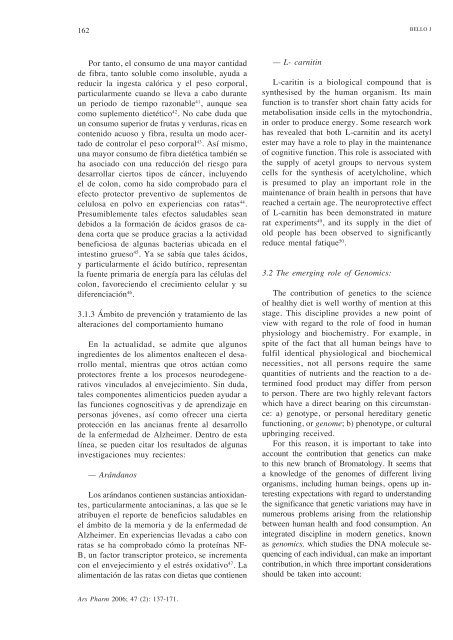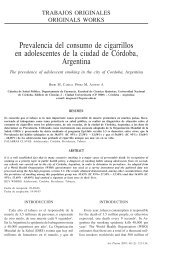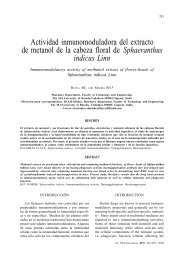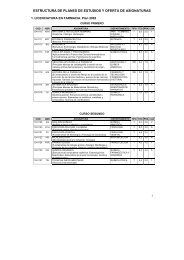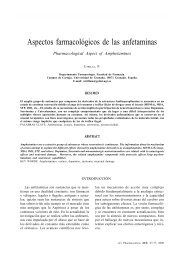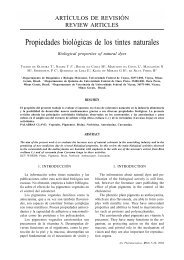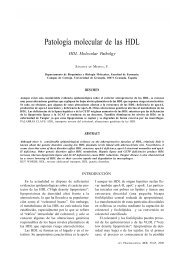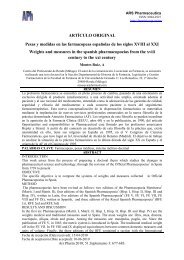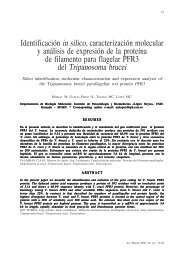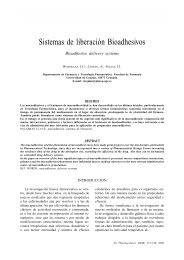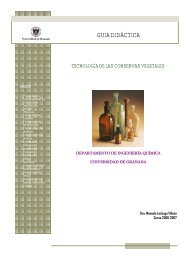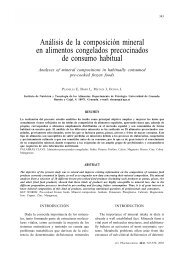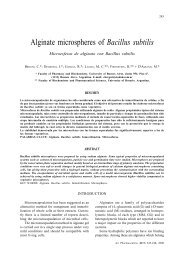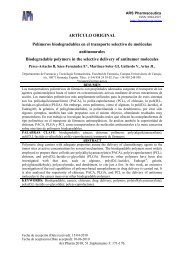La ciencia de los alimentos saludables: una panorámica actual
La ciencia de los alimentos saludables: una panorámica actual
La ciencia de los alimentos saludables: una panorámica actual
You also want an ePaper? Increase the reach of your titles
YUMPU automatically turns print PDFs into web optimized ePapers that Google loves.
162<br />
Por tanto, el consumo <strong>de</strong> <strong>una</strong> mayor cantidad<br />
<strong>de</strong> fibra, tanto soluble como insoluble, ayuda a<br />
reducir la ingesta calórica y el peso corporal,<br />
particularmente cuando se lleva a cabo durante<br />
un periodo <strong>de</strong> tiempo razonable 41 , aunque sea<br />
como suplemento dietético 42 . No cabe duda que<br />
un consumo superior <strong>de</strong> frutas y verduras, ricas en<br />
contenido acuoso y fibra, resulta un modo acertado<br />
<strong>de</strong> controlar el peso corporal 43 . Así mismo,<br />
<strong>una</strong> mayor consumo <strong>de</strong> fibra dietética también se<br />
ha asociado con <strong>una</strong> reducción <strong>de</strong>l riesgo para<br />
<strong>de</strong>sarrollar ciertos tipos <strong>de</strong> cáncer, incluyendo<br />
el <strong>de</strong> colon, como ha sido comprobado para el<br />
efecto protector preventivo <strong>de</strong> suplementos <strong>de</strong><br />
celu<strong>los</strong>a en polvo en experiencias con ratas 44 .<br />
Presumiblemente tales efectos <strong>saludables</strong> sean<br />
<strong>de</strong>bidos a la formación <strong>de</strong> ácidos grasos <strong>de</strong> ca<strong>de</strong>na<br />
corta que se produce gracias a la actividad<br />
beneficiosa <strong>de</strong> alg<strong>una</strong>s bacterias ubicada en el<br />
intestino grueso 45 . Ya se sabía que tales ácidos,<br />
y particularmente el ácido butírico, representan<br />
la fuente primaria <strong>de</strong> energía para las células <strong>de</strong>l<br />
colon, favoreciendo el crecimiento celular y su<br />
diferenciación 46 .<br />
3.1.3 Ámbito <strong>de</strong> prevención y tratamiento <strong>de</strong> las<br />
alteraciones <strong>de</strong>l comportamiento humano<br />
En la <strong>actual</strong>idad, se admite que algunos<br />
ingredientes <strong>de</strong> <strong>los</strong> <strong>alimentos</strong> enaltecen el <strong>de</strong>sarrollo<br />
mental, mientras que otros actúan como<br />
protectores frente a <strong>los</strong> procesos neuro<strong>de</strong>generativos<br />
vinculados al envejecimiento. Sin duda,<br />
tales componentes alimenticios pue<strong>de</strong>n ayudar a<br />
las funciones cognoscitivas y <strong>de</strong> aprendizaje en<br />
personas jóvenes, así como ofrecer <strong>una</strong> cierta<br />
protección en las ancianas frente al <strong>de</strong>sarrollo<br />
<strong>de</strong> la enfermedad <strong>de</strong> Alzheimer. Dentro <strong>de</strong> esta<br />
línea, se pue<strong>de</strong>n citar <strong>los</strong> resultados <strong>de</strong> alg<strong>una</strong>s<br />
investigaciones muy recientes:<br />
— Arándanos<br />
Los arándanos contienen sustancias antioxidantes,<br />
particularmente antocianinas, a las que se le<br />
atribuyen el reporte <strong>de</strong> beneficios <strong>saludables</strong> en<br />
el ámbito <strong>de</strong> la memoria y <strong>de</strong> la enfermedad <strong>de</strong><br />
Alzheimer. En experiencias llevadas a cabo con<br />
ratas se ha comprobado cómo la proteínas NF-<br />
B, un factor transcriptor proteico, se incrementa<br />
con el envejecimiento y el estrés oxidativo 47 . <strong>La</strong><br />
alimentación <strong>de</strong> las ratas con dietas que contienen<br />
Ars Pharm 2006; 47 (2): 137-171.<br />
— L- carnitin<br />
BELLO J<br />
L-caritin is a biological compound that is<br />
synthesised by the human organism. Its main<br />
function is to transfer short chain fatty acids for<br />
metabolisation insi<strong>de</strong> cells in the mytochondria,<br />
in or<strong>de</strong>r to produce energy. Some research work<br />
has revealed that both L-carnitin and its acetyl<br />
ester may have a role to play in the maintenance<br />
of cognitive function. This role is associated with<br />
the supply of acetyl groups to nervous system<br />
cells for the synthesis of acetylcholine, which<br />
is presumed to play an important role in the<br />
maintenance of brain health in persons that have<br />
reached a certain age. The neuroprotective effect<br />
of L-carnitin has been <strong>de</strong>monstrated in mature<br />
rat experiments 49 , and its supply in the diet of<br />
old people has been observed to significantly<br />
reduce mental fatique 50 .<br />
3.2 The emerging role of Genomics:<br />
The contribution of genetics to the science<br />
of healthy diet is well worthy of mention at this<br />
stage. This discipline provi<strong>de</strong>s a new point of<br />
view with regard to the role of food in human<br />
physiology and biochemistry. For example, in<br />
spite of the fact that all human beings have to<br />
fulfil i<strong>de</strong>ntical physiological and biochemical<br />
necessities, not all persons require the same<br />
quantities of nutrients and the reaction to a <strong>de</strong>termined<br />
food product may differ from person<br />
to person. There are two highly relevant factors<br />
which have a direct bearing on this circumstance:<br />
a) genotype, or personal hereditary genetic<br />
functioning, or genome; b) phenotype, or cultural<br />
upbringing received.<br />
For this reason, it is important to take into<br />
account the contribution that genetics can make<br />
to this new branch of Bromatology. It seems that<br />
a knowledge of the genomes of different living<br />
organisms, including human beings, opens up interesting<br />
expectations with regard to un<strong>de</strong>rstanding<br />
the significance that genetic variations may have in<br />
numerous problems arising from the relationship<br />
between human health and food consumption. An<br />
integrated discipline in mo<strong>de</strong>rn genetics, known<br />
as genomics, which studies the DNA molecule sequencing<br />
of each individual, can make an important<br />
contribution, in which three important consi<strong>de</strong>rations<br />
should be taken into account:


